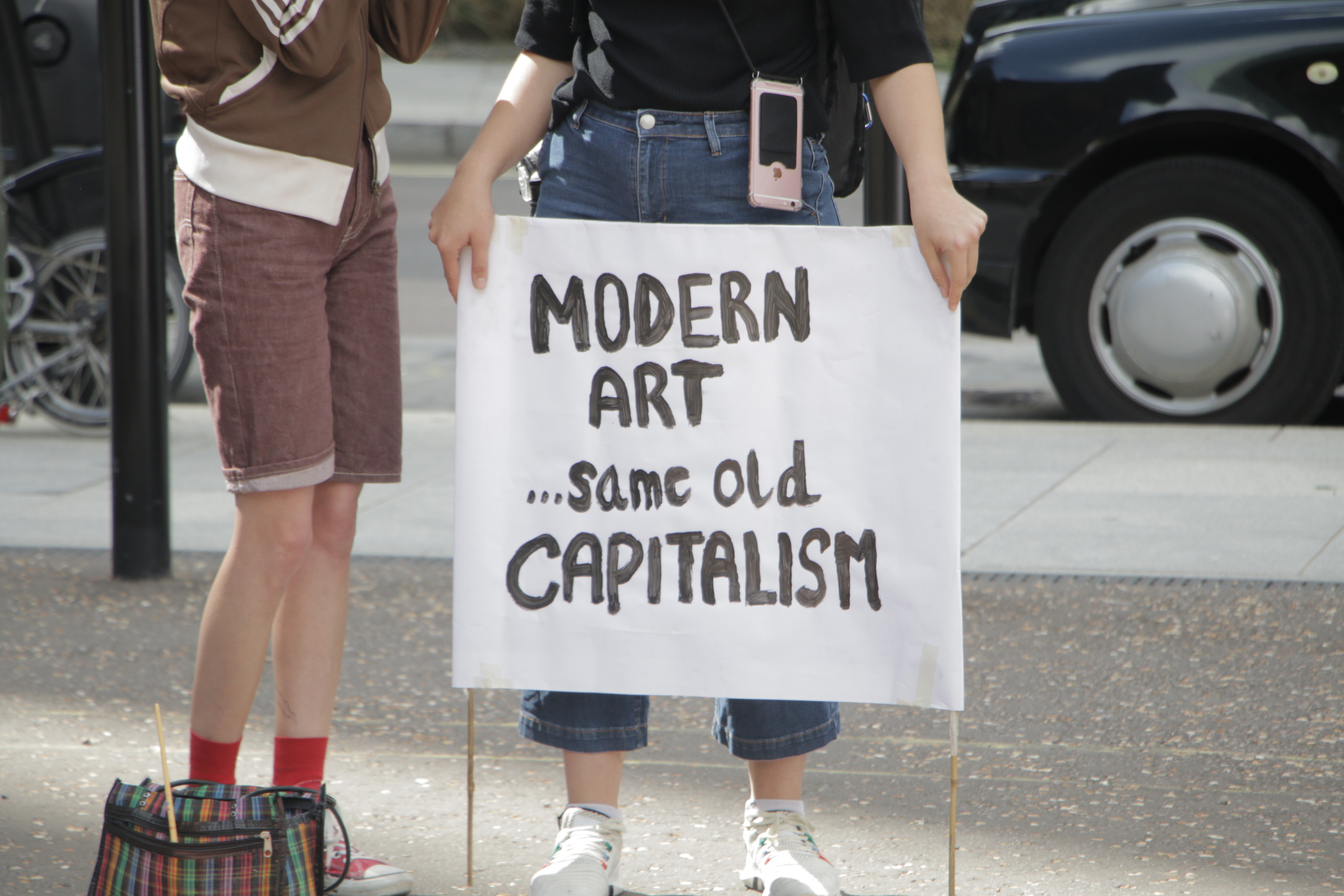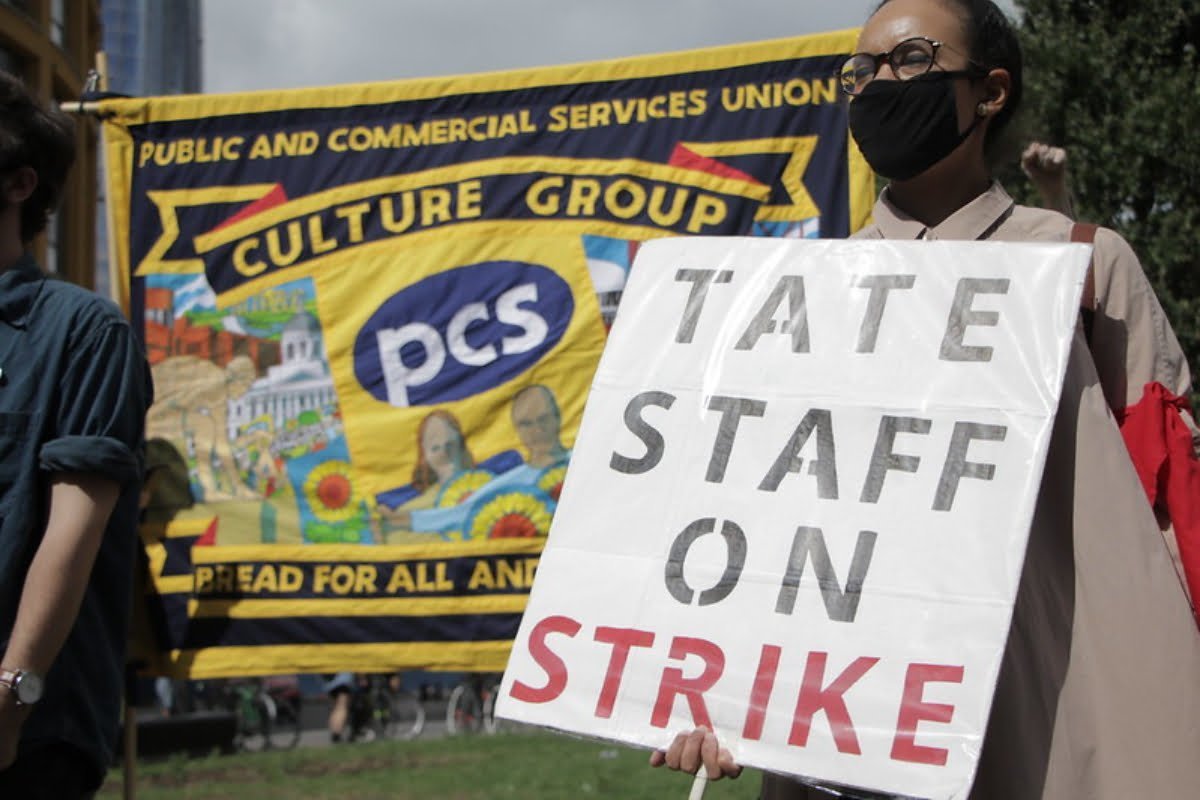The strike by PCS members at the Tate galleries against job cuts is continuing into its second week. We report here from a recent rally in support of the striking workers. We say: make the bosses pay for this crisis!
Last Saturday, on 22 August, the first week of strike action by PCS members at the Tate galleries culminated in a sizable – but socially distanced – rally outside the Tate Modern in London.
The demonstration saw speeches and performances from striking workers and from artists, activists, and politicians showing solidarity.
Jeremy Corbyn joined the rally, offering his support, and giving a speech that was extremely well-received by the assembled crowd.
The former Labour leader emphasised the importance of fighting to protect the arts and culture, which are strangled under capitalism. And he connected the Tate workers’ struggle with the government’s appalling handling of coronavirus; the need to defend public healthcare now more than ever; and the U-turn that students up and down the country had successfully forced the government into.
Corbyn closed with an anecdote from the life of Keir Hardy, which touched upon both the importance of trade unions and the need for solidarity between native-born workers and migrant workers.
Demands
 Workers from the profit-generating cafes and shops at the Tate – run by Tate Enterprises, a subsidiary of Tate – are organised within the PCS union. They have been striking for over a week now, against attempts by management to make 313 staff redundant across the galleries.
Workers from the profit-generating cafes and shops at the Tate – run by Tate Enterprises, a subsidiary of Tate – are organised within the PCS union. They have been striking for over a week now, against attempts by management to make 313 staff redundant across the galleries.
The strong sentiment amongst the striking workers is that this is unacceptable, especially given that the Tate Group is soon expected to see a £7 million injection of emergency government funding.
The workers are demanding:
- That no redundancies are carried out whilst senior executives at the Tate remain on six-figure salaries.
- That 10% of the £7 million from the government is set aside to safeguard jobs.
- And that, if the government’s bailout money for the culture sector isn’t enough, Tate Enterprises joins with PCS to demand that the government do more.
One big family?
In emails to their employees over the summer, Tate management referred to all their staff as ‘one big family’. Actions speak louder than words, however. And in its behaviour towards 313 of its workers, Tate Enterprises have been far from familial.
At Saturday’s rally, striking workers told Socialist Appeal of their frustration that Tate are still advertising jobs in the galleries, as well as contracting out security roles, Meanwhile, hundreds of retail staff are being shown the door. The workers feel that more should be done to keep staff on the books, particularly as there is still work going.
Moreover, the workers complained that Tate Enterprises “didn’t budge an inch” during negotiations this summer. They expressed their suspicions that the galleries are taking advantage of the coronavirus crisis to carry out attacks on jobs and conditions.
The fear is that management is looking to move from a model where retail workers are hired by the Tate’s subsidiaries, to one in which retail staff are contracted in from third-party organisations—the more common model found in museums and galleries in London.
Contortions
 The Tate Group has charitable status, and receives funding from public money. Tate is sitting on a significant amount of back-up funds. But workers are being told that none of this wealth can be accessed to spare them their livelihoods.
The Tate Group has charitable status, and receives funding from public money. Tate is sitting on a significant amount of back-up funds. But workers are being told that none of this wealth can be accessed to spare them their livelihoods.
Tate Enterprises is a company, the bosses point out; and charities cannot provide funds to companies. This is despite the fact that Tate Enterprises’ whole raison d’être is to make a profit for Tate!
These absurd legal contortions also prevent workers at the Tate galleries from striking in solidarity with the retail staff at Tate Enterprises. And if management gets their way, the same arguments will be used to intercept the government’s recent bailout money for the culture sector, and prevent any of the 313 jobs at risk from being saved.
For the workers, the situation is clear. In so-called ‘normal’ times, Tate will happily pay them low wages and exploit them to turn a profit. But when crisis descends, workers are the ones who are made to foot the bill.
Solidarity
This same dynamic is playing out across the culture sector. Over 400 jobs are also under threat at London’s Southbank Centre. And with the government’s furlough scheme soon to be withdrawn, the worst is yet to come for workers in the arts industries – and in all sectors.
The PCS retail staff at Tate Enterprises are demonstrating that collective action is the best weapon the working class has in its arsenal. The whole labour movement needs to come out in support of the striking Tate workers, and demand that it is the bosses – not the working class – that is made to pay for this crisis.
The striking workers are urging Tate members to stand in solidarity by cancelling their membership, and making it clear to Tate management why they are doing so. Readers can also support the workers by contributing to their strike fund. Follow Tate United on Twitter for regular updates and information.






